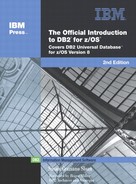Open standards
Open standards provide a framework for e-business that is widely accepted across the computer industry. With common standards, customers and vendors can write application programs that can run on different database systems with little or no modification. Application portability simplifies application development and ultimately reduces development costs.
IBM is a leader in developing open industry standards for database systems. IBM work in the database standards arena includes the following activities:
IBM submitted over half of the accepted proposals for the newest version of the SQL standard that is planned for 2003.
IBM is a key contributor to developing the first widely used standard for accessing SQL from Java (JDBC).
IBM helped create the SQLJ standards, which further integrate SQL with Java. IBM continues to drive enhancements to those standards.
IBM is a key contributor to many of the XML-related specifications that are being developed by the World Wide Web Consortium (W3C), such as standards for XML schema and XML query. IBM also contributes to the SQL/XML specification that is being developed as part of the SQL standard.
Although this section focuses on SQL:2003, JDBC, and SQLJ, IBM is also involved in many other standards that relate to database technology. These other standards include Enterprise JavaBeans (EJB) and Distributed Relational Database Architecture (DRDA).
SQL-related standards
This section describes the SQL-related standards.
SQL standard (SQL:2003)
The SQL:2003 ANSI/ISO standard, which replaces SQL99, includes many enhancements to SQL99.
DB2 UDB for z/OS includes the following functionality that appears in the SQL:2003 standard:
Multimedia support, which provided SQL Extenders for text, image, and spatial data
Extensions to SQL for online analytical processing and business intelligence
Federated database support in DB2 Universal Database for Linux, UNIX, and Windows, as described in “Sources of data” on page 20
Object-relational extensions (user-defined types, user-defined functions, and so on)
Extensions to definitions of base tables, including support for identity columns and the ability to define a table that is based on the result of a query expression
Extensions for SQL-invoked user-defined functions and procedures, table functions, and untyped parameter markers
SQL and Java standards (JDBC and SQLJ)
JDBC and SQLJ are the two main standards that relate to accessing a database from Java.
The JDBC API 3.0 Specification, Final Release published by Sun Microsystems defines JDBC.
The following two parts of the SQL standard define SQLJ:
Part 10 specifies the SQLJ language syntax and semantics for embedded SQL statements in a Java application.
Part 13 specifies extensions that define:
- Installation of Java classes in a relational database
- Invocation of Java static methods as SQL stored procedures or functions
- Extensions for accessing Java classes as SQL structured types
DB2 UDB for z/OS support for SQLJ includes Part 10 of the SQLJ specification and a subset of Part 13.
DB2 UDB for z/OS conformance
The SQL in DB2 UDB for z/OS and in other DB2 UDB family members is consistent with the SQL 1999 Core standard. The SQL 1999 Core standard refers to the ANSI/ISO Core Level SQL standard of 1999 and to related industry standards. ![]()
The SQL in DB2 UDB products also provides functional extensions to the SQL 1999 Core standard. For example, many of the scalar functions that are defined in this book are extensions to the SQL 1999 Core standard.
